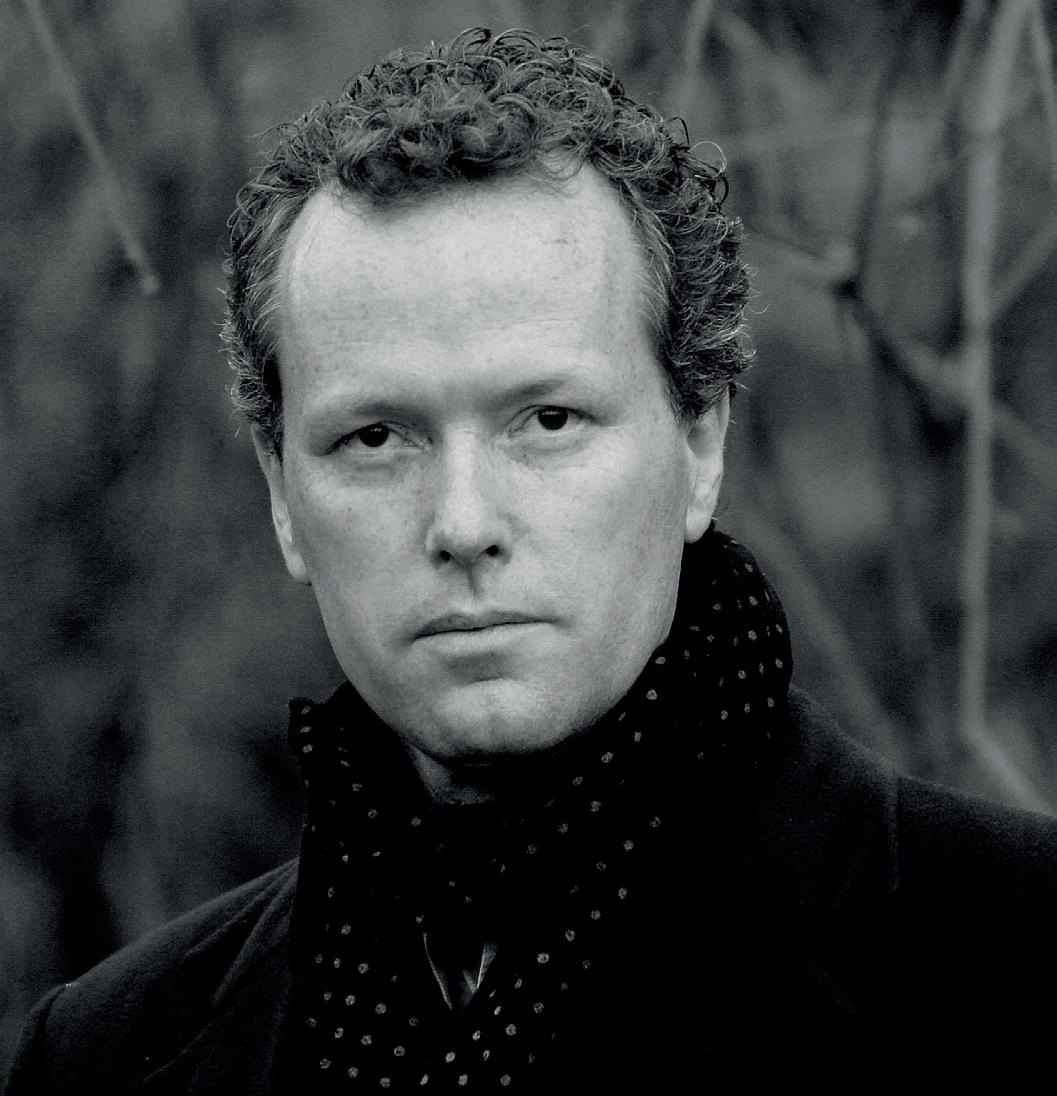Parallel Lines
Edw A rd s t Aubyn
J ONA THAN CA PE
LO NDO N
Jonathan Cape, an imprint of Vintage, is part of the Penguin Random House group of companies whose addresses can be found at global.penguinrandomhouse.com
Vintage, Penguin Random House uk , One Embassy Gardens, 8 Viaduct Gardens, London sw 11 7bw penguin.co.uk/vintage global.penguinrandomhouse.com
First published by Jonathan Cape in 2025
Copyright © Edward St Aubyn 2025
Edward St Aubyn has asserted his right to be identified as the author of this Work in accordance with the Copyright, Designs and Patents Act 1988
Quotes on page 26 from ‘Changes’ by David Bowie; on page 30 from ‘Take Me to the Hospital’ by Liam Howlett, ‘Under My Wheels’ by Michael Bruce, Dennis Dunaway and Bob Ezrin and ‘I Wanna Be Sedated’ by Dee Dee Ramone, Joey Ramone and Johnny Ramone; on page 40 from ‘Take Me Home, Country Roads’ by Bill Danoff, Taffy Nivert and John Denver; on page 65 from ‘Shelter from the Storm’ by Bob Dylan; on page 114 from ‘Men of Good Fortune’ by Lou Reed; and on page 150 from ‘Use This Gospel’ by Kanye West, Gene Thornton, Terrence Thornton, Kenneth Bruce Gorelick, Angel Lopez, Michael Suski, Federico Vindver, Timothy Mosley, Jahmal Gwin, Jordan Timothy Jenks, Derek Watkins, Rennard East and Matthew Leon.
No part of this book may be used or reproduced in any manner for the purpose of training artificial intelligence technologies or systems. In accordance with Article 4(3) of the DSM Directive 2019/790, Penguin Random House expressly reserves this work from the text and data mining exception.
Typeset in 12/16pt Sabon MT Pro by Jouve (uk ), Milton Keynes Printed and bound in Great Britain by Clays Ltd, Elcograf S.p.A.
The authorised representative in the EEA is Penguin Random House Ireland, Morrison Chambers, 32 Nassau Street, Dublin d 02 yh 68
A CIP catalogue record for this book is available from the British Library hb isbn 9781787335592 t P b isbn 9781787335608
Penguin Random House is committed to a sustainable future for our business, our readers and our planet. This book is made from Forest Stewardship Council® certified paper.
What made the countryside countryside, thought Sebastian, a city boy born and bred, going very fast now, was the enormous gaps between the buildings, the gaping wounds, the wasted space. A rabbit twitching its way through the wet grass, or a desperate squirrel flinging itself from branch to branch, could not explain all that green unpleasant land. Sword in my hand. There must be an invisible city there, a bombed- out city, full of incandescent ghosts; men, women and children, rushing about like human torches, passing on their torment to the innocent woodland creatures, making rabbits hobble and squirrels take flight. Going screwy, chasing their tails around a trunk.
Rapid stabbing motion all over his chest.
He could also see, through the reinforced glass (he wished he was reinforced glass), a herd of cows dotted across a nearby hill, their brown and white hides waiting for the tanners to turn them into shoes. They weren’t fleeing or limping because they were tethered by their appetites, wrenching roots from the ground with a twist of their stooped heads and juicing the grass with their slow rotating jaws. Masturbating. Milked for all they were worth. Sometimes, the sound of tearing roots was so loud he had to block his ears and hum to himself. Those shoes in ancient times.
Cows needed three or four stomachs to rip apart the tough fabric of the universe, to break down the cellulites, or cellophane, or cell mates, there was a word for it, the cell phones that bound
everything together. A cow could stomach anything, any amount of connectivity. He wished he could stomach anything – anything at all – but he couldn’t digest his own thoughts, they came so thick and fast.
Another huge plus about being a cow was that you got to be humanely slaughtered, which explained why there weren’t any cows in this hospital, pacing up and down, day and night, working out how to top themselves. They had it all arranged for them. It was a package deal, a luxury holiday, being a grass-fed cow. A cow-fed cow got Mad Cow Disease and who could blame them? It was like crashing in the Andes and having to eat your fellow passengers: enough to drive anyone round the bend.
Dr Carr said the hospital was a temporary measure, but everything was a temporary measure, when you thought about it, with the possible exception of death. Unless you were Tibetan, or whatever, and thought that death only lasted as long as a summer holiday, and then you came back again, wishing you had enough stomachs to stomach the whole thing. It was a package deal, with life on either side, spitting you out one end and devouring you another. Going very fast now. There was a bobsleigh called a ‘skeleton’ where you went headfirst. That’s what he was on, a skeleton, hurtling downhill headfirst, and even if he topped himself, he would soon be hurtling back down again, after a confusing summer holiday in St Bardo, the island of your nightmares, down into a family of absolute cunts, whose only plan was to wire you up to be a suicide bomber. Hurtling down with Very Early Alzheimer’s, not remembering a thing about the last time he was squeezed out of his temporary mother’s fleshy body, like a sharp little olive stone, left to dry on a saucer before being chucked in the bin. That’s where he was now, in the bin, under observation.
Dr Carr said he would visit him again in the Suicide Observation Room. It was a stupid name for this naked little room
with nothing in it to help you on your way, not so much as a box of matches or a curtain cord. With a name like that, you would have thought it would be stuffed with pistols and daggers and grenades and cyanide capsules so that people who liked observing suicide had something to look forward to. Modern life being what it was – ever- accelerating – you couldn’t expect them to hang about waiting. Or maybe the Observers liked to set a challenge. This room was beyond a challenge, though; it was bloody ridiculous. Even if he ran his skeleton headfirst into the wall, he could only knock himself out trying.
‘Go on, knock yourself out trying,’ said an Observer.
They were probably lounging at home, watching him on TV, saying in their dead posh voices, ‘I wonder if he’ll find a way. The last one bit his own tongue off and bled to death and the one before that inhaled her own food and managed to choke silently – such discipline! Such gusto! Bravo! Bravissimo!’
‘I had to bite my tongue so hard, I practically bit it off,’ his Fake Mum used to say every time her sense of outrage was provoked, which was every time she left the house. When she stayed at home, she didn’t bite her tongue, she spoke her mind, or pursed her lips.
‘This one is simply dreadful,’ said Dead Posh. ‘He’s either staring at the cows through a shatter- proof window or being stared at through a shatter-proof door . . .’
‘By that fat cow!’ Sebastian shouted, swivelling around to see if he could catch her observing him through the strip in the door. He was encircled by cows; he was being cattle-prodded from all sides.
‘Oh, God, let’s watch Sharia Law,’ said a Vicious Viewer, ‘or The Euthanasia Channel – even someone sipping barbs in Zurich, surrounded by adoring relatives, is better than this dire episode.’
He was being a dire episode. He wasn’t just having a dire episode he was being one this time.
‘We’ve upgraded you from a classic Having room to one of our superior Being rooms,’ he lisped, like that Spanish receptionist at the resort hotel where his fake parents had booked a family holiday the August after his first episode. When they were all shown the special room, he could hear his Fake Mum screaming: If this is an upgrade, what kind of a shithole were you planning to put us in?
But she bit her tongue and instead she said: ‘Very nice. Thank you very much.’
Yes, thank you very much for the upgrade. He was now officially Being the worst episode in the history of the universe – the series – the whole thing, whatever. Rapid stabbing motion all over his chest.
He couldn’t even star in Suicide Observation Room. They would have to kill the series and replace it with Celebrity Suicide Observation Room to improve the ratings. They wouldn’t let a little nobody like him on a series like that. The only way someone like him could get onto the news was by shooting hundreds of innocent men, women and children, especially children. Bonus points. Even then, there was so much competition for attention he might not make it.
‘What?’ said the Vicious Viewer. ‘That ghastly little bore on Celebrity SOR ? Don’t make me laugh!’
Must slow down, must slow down. Not a bore but a borehole. In the ground. Searching for water. To mend the cracked earth. To dissolve the dust devils into fertile fields of whispering wheat. Sebastian closed his eyes and swayed from side to side. He was being wheat now. He was swaying and he was rustling. It was lovely to feel the warm air, like Gabriella, running its fingers gently through the golden wheat.
He mustn’t get so stressed, or so distressed. Although distress sounded like it was the opposite of stress, they were closely related. They weren’t identical twins. The identical twin of stress
was stress, and the identical twin of distress was distress, but stress and distress were weirdly related, they had a syllable in common, but an uncommon dis.
Shut up. He was being a field of wheat now. He didn’t want to be a family of words divided against themselves, he wanted to be a fucking field of wheat.
Why wasn’t he allowed a little peace? A little peace with no action.
Why wouldn’t they leave him alone? So alone without them.
‘Give it a rest, me old son,’ he whispered, and went on swaying, until he was startled by the sound of the door being unlocked.
It was Dr Carr, wearing his washable maroon mask. There’d been a Covid case in the hospital and now they were behaving as if it was lockdown all over again.
Ben, the nurse, who was wearing a blue surgical mask, came in carrying two light chairs, which he put about a coffin’s length apart from each other.
‘Remember, Seb, you don’t cross this space, right?’ said Ben. ‘And put your mask on for Dr Carr.’
Sebastian stayed by the window, immobile until Ben had closed the door behind him. Then he turned abruptly on Dr Carr.
‘I don’t want to be radicalised,’ he shouted.
‘I’m sure that none of us want you to be radicalised,’ said Dr Carr, sitting down calmly and looking at Sebastian with kindness and concern. ‘That’s what terrorists do when they want to turn someone into a suicide bomber. Whereas we’re all very concerned about your safety, Sebastian, about your bodily safety.’
That was Dr Carr for you. Hole in one. Bastard.
‘Fuck you,’ he said. ‘You’re trying to psychoradicalise me.’
He noticed that just by being there, Dr Carr had opened a little breathing space between his thoughts and his reaction to his thoughts, which was slowing things down a bit. Bastard.
If things slowed down too much, he would start feeling the Big Grief, from tip to toe, from Land’s End to John O’Groats, from the equator to the pole, from the small blue dot to the ever-accelerating expansion of the universe that might rip the old centres apart. The fabric might be stretched to tearing point. Or it could just be the rolling out of more fabric in every direction at once – because it was literally making it up as it went along – making space for itself by expanding.
There was no stopping once he started thinking about it, and if he tried to reverse it, it came rushing in on him until he disappeared, along with everything else, into a tiny black hole in the middle of his body, which then swallowed itself up as well.
He pressed his hands over his ears and scrunched up his eyes. The fuse was lit, there was no turning back, he was thinking about Infinity.
‘I’m having a bad word,’ he said. ‘Begins with an I.’ He stretched out his arms as far as he could reach and then brought them back and crushed his palms together. ‘The universe,’ he hinted.
‘Begins with U,’ said Dr Carr, not missing a beat. Bastard.
‘Your U is my I and my I is your U,’ said Sebastian, moving very fast again. ‘Mirroring. You were mirroring me, but you know that mirrors are one of my worst things. So, you are deliberately trying to push me over the edge, you cold-hearted bastard.’
‘Well, that’s a very interesting interpretation,’ said Dr Carr, ‘but I was just trying to point out that the word you find difficult could not be “Universe” because it begins with the wrong letter. We’ve talked before about some of your bad words . . .’
‘No end in sight,’ said Sebastian.
‘Ah, yes,’ said Dr Carr. ‘Well, it’s certainly true that neither of us can see as far as the end of the universe, but maybe there’s something closer to home that you also feel has no end in sight, perhaps that’s what you’re feeling about your recent setback.’
Dr Carr was trying to be a psycho-nanny-list, trying to turn the big, frightening universe into something more manageable, but the bad words and phrases were stronger than that. They were like the tentacles of the Giant Pacific Octopus in the documentary he had watched the other day in the Telly Room. A bleachblond American diver, sitting in a folding chair, bobbing up and down on the deck of his boat, had told the story of his life-anddeath struggle with one of these monsters of the deep. This bloke was a real man, with more hair bursting out of his short-sleeved pink shirt than an orangutan, and while he held himself spellbound with his yarn, they did a Reconstruction of his harrowing adventure: an actor, in full scuba gear, falls backwards off the side of a boat, and down he goes, flapping his flippers, trailing a broken necklace of bubbles, a speargun in his hand, a knife in his belt, and a watch the size of Big Ben on his wrist, hunting for his sunken treasure.
At this point, Diver Boy bangs on about how much one of these – they aren’t exactly fish, more like cellophones, or cellulose, there was a word for it, cell pods, whatever – is worth. Cut to: Dead Posh Restaurants : tinted harbour lights wobbling across the black waters towards a portside restaurant; cappuccino waves foaming on rocks below a cliffside restaurant. What they all want is octopus. The managers are desperate. Indoors, a besotted man is proposing to Gabriella who, it turns out, has only agreed to have dinner with him to explain, personally and warmly, that she never wants to see him again, although she hopes they will remain friends. Anyway, whatever the special occasion, a waiter always arrives with a tiny morsel of perfectly burnt octopus for which the besotted bloke has taken out a bank loan.
So, imagine Diver Boy’s excitement when he reaches the cold dim seabed and sees a fat tentacle draped over a rock next to the mouth of a cave. This was his meal ticket, his mortgage, his alimony, his car payments, a year’s worth of diesel and
compressed air, all packaged in the bulbous head of the Ocean Martian lurking in his lair. Reconstruction : an actor squeezes the trigger, and the spear pierces the darkness of the cave with a confident hiss. To his surprise, there is no cloud of black ink or copper-blue blood; he just watches the fat tentacle slide back, while another one comes out of nowhere and wrenches the weapon from his hand. Then, before he can work out what’s going on, a third tentacle curls around his leg and drags him down to the mouth of the cave, where the eight-limbed hunter has now taken up residence, after tricking his half-limbed assailant into expending his useless spear.
At this point, Sebastian was completely on the side of the octopus. He cheered and jumped up and down in his seat, until Ben threatened to take him back to the SOR because he was upsetting the other patients. They were worried about Diver Boy, who was now splayed across a rock, having his mask ripped off by a dish fit for a king; or for a broken-hearted lover, if it came to that.
It was only when he was back in the discomfort of his room that Sebastian had started to recognise the tentacles for what they were: bad words that slithered out of cave mouths and tore the mask from his face, blurring his vision while he ran out of air, his clenched muscles clenched by muscles more muscular than his own. It was happening to him again right now.
‘Boom!’ said Sebastian, throwing his arms into the air and flinging himself against the wall. The fuse had run out. The bomb had gone off. The infinity bomb, the suicide bomb, the whole thing, shattering the mirrors, shattering the shatter-proof glass. Raining blood and crystal. Sebastian crouched down and sheltered on the far side of the bed, covering his head to protect himself from the lacerating debris.
He could remember a time, while he was working for Mr Morris at Party Solutions, when the bad words had started to
lose their grip. After practising a few times in his sessions, he was able to say, without so much as a by- your- leave, ‘Don’t throw the baby out with the bathwater.’ He started to use the phrase so often that his workmates had been able to tease him – in a friendly way. He recognised that they had been teasing him in a friendly way, although it was hard to imagine now. Friendly teasing was a contradiction again but, to do it justice, in his current frame of mind even 2 = 2 seemed like a contradiction: the second 2 must be different from the first one as it was no longer in the same place. What was it up to? What was its game? Teleportation? Bilocation? Was it having a secret intercontinental equation with its opposite number in Washington, flitting back and forth across the equals sign, fast enough that nobody noticed the empty desks while they were both in transit?
Back then, his workmates had started to use his bad words and phrases, not to torment him, but to make the words that threatened to torment him seem more ordinary. There was only Steve, one of the cooks, who took advantage of Sebastian’s openness and deliberately tried to push him over the edge.
‘Oi, Seb,’ he would shout out, when he was pressing a steak into the frying pan with his spatula, to make it smoke and sizzle, ‘do you like the smell of burning flesh ?’
And then Steve would let out a hoot of triumphant laughter as Sebastian hurried away.
The first time it happened, Sebastian had gone to hide in the pantry where they kept the catering glasses. He sat on the floor, with his forehead pressed to his clutched knees.
‘I’m wrestling with my demons,’ he muttered to himself, trying to cut at least one of the tentacles that was wrapped around him, but ‘the smell of burning flesh’ was still dragging him back towards the frying pan and the fire.
Gabriella came in and sat down next to him. At first, she
didn’t say a word but just pressed her shoulder against his as a sign of solidarity.
‘Don’t worry about Steve,’ she said eventually. ‘Some people are just like that.’
‘He’s a nasty piece of work,’ mumbled Sebastian, looking at her sideways.
He must have looked very distressed because she swept aside the hair that had fallen across his stooped face and turned his head gently towards her, gazing into his eyes.
‘Don’t let him get to you, Seb; we’re all on your side. He’s the one with a problem as far as we’re concerned.’
He felt as if he was about six, which was quite a lot older than he had felt before, so that was a move in the right direction (or not).
‘Okay,’ he said.
She ran her fingers through his hair and rested them briefly against the side of his head and it was the loveliest thing he’d ever felt, and he wanted to be with her for ever and ever, world without end, Amen.
The memory of this ravishing moment drove Sebastian out from behind his hospital bed. He paused on all fours, at the corner of the metal frame, glancing sideways; his gaze level with Dr Carr’s shoes.
‘Can you hear the sound of falling glass?’ he asked in a hoarse whisper.
Dr Carr said nothing, giving him the silent treatment.
‘We’ve all been badly cut,’ Sebastian went on, speaking rapidly and only just audibly. ‘All the woodland creatures have been cut and burnt in this terrible tragedy. It was a suicide bomber. The prime minister said it was “a horrendous and cowardly act” and that the victims were “ordinary men, women and woodland creatures trying to do the right thing” and that his “thoughts and prayers were with the hearts and minds of the families and
friends who have lost loved ones”. The bomber was captured on CCTV thirty- four times before he arrived at the hospital. He was carrying a black rucksack bristling with copper wires and “Danger! Explosives!” written on the back. With all the CCTVs, there just aren’t enough people to look at the footage, but at least you can make a film about it afterwards.’
Sebastian burst abruptly into song: ‘That’s entertainment!’ he roared, before resuming his rapid whisper.
‘The explosion blew up all the windows and the mirrors. Some of the cows have been badly hurt. In fact,’ he went on, excited by the breaking news, ‘the cow who stares at me through the glass door is actually dead and – and Ben is in the emergency room, having pieces of glass pulled out from all over his body. So, he won’t be coming back in a hurry.’
‘And yet you and I are still here,’ said Dr Carr.
‘Yeah,’ said Sebastian, ‘we’re survivors. We’re bound to be interviewed, so we can tell our side of the story.’
‘It’s interesting that you say “side” in the singular,’ said Dr Carr. ‘That suggests that you feel we are on the same side, that we have a shared point of view. Perhaps there is a mirror that was not destroyed in the explosion, a mirror that we have made together, which enables you to see yourself more clearly.’
‘Bastard,’ said Sebastian. ‘That’s why you brought me here, because it’s the only place in the entire country where there are enough people to be on camera and to watch the footage at the same time. It’s a fully staffed facility. You’re trying to pin it on me! You’re trying to frame me!’
‘Or perhaps we’re trying to frame the mirror, so we know where it ends: what is a true reflection of you and what is something else. I know that mirrors played a very central role in your first episode in the Portobello Road. You felt that they were supervising you in a persecutory way. The whole sky turned out to be made of that kind of mirror and when you shattered it with
the blue beam, you felt that you had won a great victory and that you had saved humanity. It was one of the best feelings of your life – at the time. Since then, though, a second kind of mirror, a benign mirror, has come into your life, one that is not overlooking you against your wishes, but which helps you to see yourself more clearly when you step into its frame.’
‘If you’re so fucking clever,’ said Sebastian, ‘how come you abandoned me? You and Simon: when the going gets tough, the tough fuck off.’
‘As we’ve discussed, there was a national lockdown and I was unable to see you in person during that time . . .’
‘It’s your fucking loony bin, you can do what you like. You could have me put down like a rabid dog.’
‘I am not the owner of this hospital,’ said Dr Carr, ‘I am a Visiting Consultant, which is why I was able to get you in here immediately after you found yourself unable to cope. You seemed to like it more than some of the other hospitals you’ve been in.’
‘That was before you abandoned me.’
‘I was not legally allowed to visit you for several weeks, but we stayed in touch by phone at all our usual times.’
‘But now they’ve taken away my cellphalopod, my cell mate, my soul mate, there’s a word for it, cell phone.’
Dr Carr said nothing.
They both knew that his phone had been confiscated because Sebastian had texted or called Gabriella two or three hundred times a day and that John, who had become the manager of Party Solutions (and Gabriella’s boyfriend), had contacted the hospital to complain.
‘You could just have me put down,’ said Sebastian.
‘I think you feel you’ve been put down all your life—’ said Dr Carr.
‘Mainly by you,’ Sebastian interrupted him angrily, ‘because
you gave me hope. You said I could have “ordinary unhappiness”, but you knew all along that I was never going to be allowed that.’
‘Well, that’s a very important subject that we can continue to discuss tomorrow,’ said Dr Carr.
Sebastian crawled backwards behind the bed again, so as not to watch him leave. He heard Ben unlock the door but did not respond to Dr Carr’s farewell. He was trying to replicate the position he was in when Gabriella had sat next to him in the glass pantry. Perhaps if he got it exactly right, he would feel that friendly pressure on his shoulder. He closed his eyes and waited.
‘Mama!’ said Noah reproachfully. ‘You’re not looking at me! I’m climbing the really high branch now. I’ve never been this high before. Last time, we said I would climb to this branch next time and now it is next time.’
‘Well done, darling,’ said Olivia, watching Noah clamber onto a slightly higher branch, straddle it, and clasp the burr in front of him, like the pommel of a saddle. She was trying to be vigilant without being anxious; ready to catch Noah if he slipped, without assuming that he would. She folded her arms firmly only to become aware of how ready she was for them to spring open into a safety net.
‘Giddy up,’ said Noah. ‘I’m riding on a diplodocus!’
He seemed to have picked up the idea of being in a saddle. There was a free trade of thoughts and impressions between people who loved each other, matched by the passion for secure borders and misunderstandings among those who didn’t. She had to give him full credit for putting the saddle on a dinosaur, which she had failed to imagine, although it would have been easy enough if she weren’t so preoccupied.
‘This time is the next time,’ said Noah, struck afresh by the insanity of time or of language, or by the acuity of his own mind. It hardly mattered, such was the joy of watching a remembered anticipation collapse into an actual event.
‘Yes, time gallops on,’ said Olivia.
Francis was already half an hour late and she longed for him
to come back. He was much more tolerant of Noah’s dinosaur obsession than she was, having passed through a similar phase, in an era of less aggressive merchandising. She had no time for dinosaurs, although a great deal was asked of her. The truth was, she loathed them. They seemed to suffer from drastic design flaws that made their hundred- and- twenty- eight- million- year rulership of the planet unfathomable: the pinhead of a brachiosaurus writhing remotely on its tentacular neck while its tree- felling torso crashed through the undergrowth, and the repulsive flying dinosaurs, instead of folding their wings against their bodies, tucking them into a pair of bony elbows on which they clattered across the ground. Apart from her longing to escape this realm of weird monsters, she sometimes simply longed to let her mind wander freely.
She saw the world as roughly divided between people who felt they were stepping out of solitude into relationships and those who felt they were stepping out of relationships into solitude, with many degrees of each basic view. Even as someone close to the centre of this divide, who was deeply involved with her family and her friends, she still had an underlying assumption that solitude was the natural state from which she emerged to engage in relationships. She couldn’t help feeling this must be fundamentally true for everyone, if only they recognised it, but she had met plenty of people from the other tribe, who were surprised and often disconcerted to find themselves alone and who filled their solitude almost exclusively with plans to bring it to an end as soon as possible. They were inclined to say things like, ‘We’re basically social animals’, especially if they had recently found themselves spending several minutes without a device, an alarm, a notification, or contact with their contacts.
It sometimes seemed strange to Olivia that she was on the solitary side of the divide, given that she had started her life sharing her mother’s womb with another human being. What
could incline a person more strongly to feel that life was all about being close to other people? Maybe the abrupt interruption of both those bonds had made Olivia feel that intimacy was an illusion, or a contingency, or a hoax. Her first companion had become a perfect stranger and her mother had immediately given her up for adoption. Her twin brother was put up for adoption a year and a half later and spent six months in an institution before a family finally took him on. Olivia knew that she had been given a much better start than him, adopted at birth by her wonderful parents, but she would not have had the good fortune to be brought up by the Carrs if her own mother had not rejected her in the first place. Perhaps this experience had formed a layer of ice deeper than the subsequent warmth, but if there was any truth to the great temperamental divide she was envisaging, it couldn’t be explained by anything as specific as her personal history. Francis, with a quite different early history, was also in the solitary tribe. Although solitary types might be expected to disavow inter-connectedness, he was obsessed with it in a way often lacking among the people who were most excited by overlapping address books. If the point of life was to discover ‘what a small world it is’, the idea of a network of all living things, and possibly of all matter (if we understood the true nature of matter), must strike the social tribe as vague and extravagant, and dementedly inclusive. What was the point of turning their attention from a family tree to a global forest that might well belong to someone they didn’t know; let alone to the biosphere, which hadn’t been fully privatised yet?
Noah had spent a term at nursery school to prepare him for the primary school he was going to this September. After tasting the possibility of successive hours without having to look after him, the return to the old pattern of constant supervision during the summer holidays felt more oppressive to Francis and Olivia than before, kicking off an arms race in the virtuous evasion of
childcare. Gone were the days when Francis walked around with a notebook and pencil, cataloguing the progress of the rewilding project going on around them in Howorth. He was now working for Hope Schwartz’s NGO, Not on Our Watch, and was helping to save Amazonian rainforest, so the unemployed Olivia had started out with a virtue deficit, but in the snatched moments when Francis was looking after Noah, she had started pitching the idea of making six radio programmes about the six most likely causes of the next – which would be the sixth – great extinction. The programmes were now commissioned by Silverline, an independent production company. She was due to record her first interview tomorrow afternoon in their studio in Soho.
Artificial intelligence, pandemics, nuclear annihilation, global warming, asteroids and overpopulation were the finalists for the Silverline production. Strong cases had been made for chemical pollution and misguided genetic manipulation, but despite their many strengths and some passionate advocates, they did not make the final cut. The order of the broadcasts would be up to the BBC, but Olivia decided to start the production with asteroids, as it seemed more relaxing to discuss the only extinction candidate that could not be attributed to human folly or the unintended consequences of scientific genius. Good old asteroids, they just came hurtling towards us, without malice or cupidity, without even sound waves, until they roared through the atmosphere in their final moments. The impact was made by them, but the debris was made by the Earth; the asteroids themselves were vaporised. Meteorites, if they didn’t turn into shooting stars or bounce back into space, made an impact not powerful enough to annihilate them, and so they formed genuine alien litter, a topic she would be discussing tomorrow with her guests but which she needed to mug up on right now. She and Francis had watched Fireball last night, Werner Herzog’s documentary about asteroids and meteorites. Francis, predictably, wanted her to discuss
panspermia, the idea that there was life throughout the universe, as evidenced by the fact that some meteorites carried the amino acids needed for proteins, the lipids needed for building cell walls and, most surprisingly, sugars from outer space. Anything beginning with ‘pan’ – panpsychism, panspermia, and indeed the intoxicating Pan himself – was a big pull for Francis, but there was still an enormous creative gap between the arrival of organic compounds and the formation of life. The theory that those compounds had come to a lifeless Earth, rather than the living Earth being an exception in a lifeless universe, was a reversal of perspectives she wanted to explore with her guests. The much more familiar idea that the universe was filled with stellar factories forging the elements in their furnaces and then dispersing them explosively through space, and that we are ‘ultimately’ made of stardust, provoked Herzog to step indignantly from behind the camera to say that Bavaria had been a bigger influence on him than stardust.
Since Olivia’s commission from Silverline, a touch of apocalyptic rivalry had crept in to Willow Cottage. Noah had only been six months old when Francis accepted Hope’s offer to work for Not on Our Watch, and so Francis had a head start. It was already four years since he made his grim journey to Ecuador, setting off for the Oriente, the Wild East of the country, to have a look for himself at ‘The Amazonian Chernobyl’. He was supposed to go every other year, but due to the pandemic had only been once. George and Emma, the owners of Howorth, were friends of Hope’s and supporters of Not on Our Watch, and had offered him an office with high-speed internet, several comfortable armchairs and a round window overlooking a cobbled courtyard in the old stables. He was probably there now, tracking ecological crimes on drone cameras halfway across the world.
‘Mama!’
Olivia glanced up quickly.
‘Fuck,’ she said, reaching up to support a toppling Noah as he grabbed at the shoots bristling from the burr. Just one moment of inattention, that’s all it took. ‘I mean, whoops. I’m not encouraging you to use that other word.’
‘Don’t worry, Mama, I don’t need encouraging,’ said Noah. ‘I already used it at nursery.’
‘Oh, really?’ said Olivia, on tiptoe, pushing Noah back onto the diplodocus. ‘What did Miss Foster have to say about that?’
‘That I shouldn’t, and I said my parents said it all the time, and she said I didn’t have to copy my parents in everything.’
‘Well, it is difficult for you if we use words and then tell you not to use them,’ she admitted.
‘That’s right,’ said Noah, deliberately tipping from the branch now that he was sure Olivia would catch him. ‘That would be pomposity,’ he said, foundering into laughter as he let go of the branch and subsided into Olivia’s arms.
She caught him as he headed down and hugged him, her face buried in his hair. He was getting so heavy.
‘Or hypocrisy,’ she suggested and then seeing his disappointment at having reached for the wrong meaning from the penumbra of words he had overheard but not fully understood, she said, ‘Anyway, a big word with exactly that rhythm: pomposity/hypocrisy/hypocrisy/pomposity.’
As she turned the words into a nonsense song, she circled around, holding Noah close to her, and they laughed together under the climbing tree.
‘Mind you,’ said Olivia, coming to a halt and not wanting to stunt Noah’s adventurous vocabulary, ‘it could be pomposity if . . .’
She could tell he was not listening.
‘Dada!’ he cried out.
Olivia turned around.
‘Ah, there you are,’ she said.
























